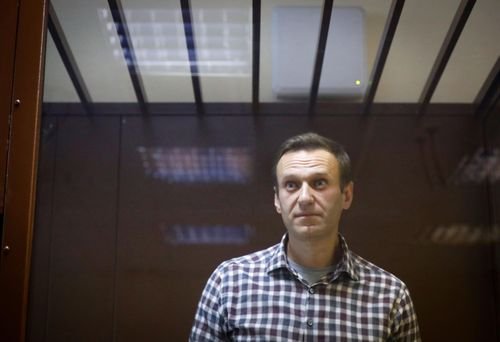Putin critic Alexey Navalny transferred to a penal colony, Russian prison service says

Russian opposition figure Alexey Navalny has arrived at a penal colony east of Moscow, to serve his prison sentence, a public commission that observes the treatment of detainees said on Sunday.
Alexey Melnikov, the secretary of the Public Monitoring Commission (ONK) in Moscow, said Navalny had been transferred to the Vladimir region.
Navalny was jailed for violating the probation terms of a 2014 case in which he received a suspended sentence of three and a half years. A Moscow court replaced the remainder of the suspended sentence with a prison term earlier this month.
Russian authorities detained Navalny in January on his arrival from Germany, where he spent five months recovering from Novichok poisoning he blamed on the Russian government. The Kremlin has repeatedly denied any involvement.
State media had reported Friday that he had been transferred from a Moscow detention center to a penal colony, although the location was not made public.
Alexander Kalashnikov of Russia’s federal penitentiary service (FSIN) told reporters Friday: “According to the court’s decision, he left to where he currently should be. Everything is done within the framework of the law and the current legislation.”
Kalashnikov added Navalny will be kept in “absolutely normal conditions.”
On Thursday, Navalny’s lawyers told CNN he had been moved from Matrosskaya Tishina detention center in Moscow but no details had been provided to Navalny’s team or his family on where he was being moved to.
Vadim Kobzev, one of Navalny’s lawyers, told CNN on Friday that he still did not know which penal colony his client had been taken to. Kobzev said that according to Russian law, prison services have up to 10 days to inform Navalny’s family where he has been moved to.
Marina Litvinovich, from Moscow’s ONK, told CNN Friday that Navalny was due to be sent to a “general regime” penal colony, the most common type of prison in Russia.
Litvinovich said prisoners are not usually kept in cells but sleep in dormitories and are divided into groups. She added prisoners can work if they choose to do so.
Mikhail Khodorkovsky, once Russia’s richest oligarch and now in exile in London, spent 10 years in a remote penal colony close to Russia’s borders with China and Mongolia — the Krasnokamensk penal colony. Khodorkovsky famously fell out with Putin by funding opposition groups and highlighting official corruption before being arrested.
After his release in 2013, Khodorkovsky told CNN in an interview that he had been stabbed in the face by a fellow inmate during his time in jail.
“When I was stabbed with a knife I was lucky — he tried to get to my eye but he got my nose,” he said. “As a result, the dentist who was there — someone who was also a plastic surgeon — carried out an operation on me, which means it was virtually not noticeable.”
Khodorkovsky also described the cramped conditions inside the colony, He said people slept in barracks, sometimes with 50 to 100 people in one room.
On his website, the former oil tycoon has written of the treatment he faced from prison authorities, who he says repeatedly accused him of “behavioural violations” in order to prevent his parole hearings from succeeding.
They also placed him in isolated cells as a punishment, Khodorkovsky claimed.
Russian authorities have categorized Navalny as a flight risk — a characterization the activist has ridiculed — so Litvinovich says he might be subjected to special supervision or searches.